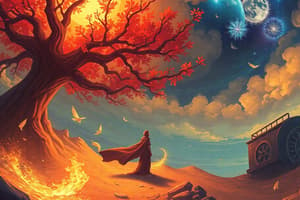Podcast
Questions and Answers
What is one of the aims of prose?
What is one of the aims of prose?
- To stir the imagination
- To evoke emotion
- To write in verse
- To convince or inform (correct)
Which of the following is a type of poetry?
Which of the following is a type of poetry?
- Novel
- Essay
- Thesis
- Ode (correct)
Which type of poetry is characterized by a structured meter and rhyme scheme?
Which type of poetry is characterized by a structured meter and rhyme scheme?
- Narrative Poetry
- Lyric Poetry
- Dramatic Poetry
- All of the above (correct)
Match the following types of poetry with their examples:
Match the following types of poetry with their examples:
What is the primary appeal of poetry?
What is the primary appeal of poetry?
What distinguishes prose from poetry in terms of language?
What distinguishes prose from poetry in terms of language?
Which of the following best describes the aim of poetry compared to prose?
Which of the following best describes the aim of poetry compared to prose?
Which type of poetry is specifically characterized as 'narrative'?
Which type of poetry is specifically characterized as 'narrative'?
Which of the following forms is NOT a type of lyric poetry?
Which of the following forms is NOT a type of lyric poetry?
What is a primary characteristic of dramatic poetry?
What is a primary characteristic of dramatic poetry?
What type of poetry typically includes a structured meter and rhyme?
What type of poetry typically includes a structured meter and rhyme?
Which characteristic primarily differentiates epic poetry from other forms?
Which characteristic primarily differentiates epic poetry from other forms?
Which of the following would NOT typically be considered lyric poetry?
Which of the following would NOT typically be considered lyric poetry?
In terms of emotional appeal, prose primarily aims to:
In terms of emotional appeal, prose primarily aims to:
How does the appeal of poetry differ from that of prose?
How does the appeal of poetry differ from that of prose?
Flashcards are hidden until you start studying
Study Notes
Essence and Division of Literature
- Literature is divided into two main forms: prose and poetry, each with unique characteristics.
- Prose: Written in paragraph form; uses ordinary language; appeals primarily to the intellect; aims to inform or convince.
- Poetry: Written in stanzas or verses; employs figurative language; appeals to emotions; aims to stir the imagination.
Prose
- Types of prose include various narrative styles, essays, and short stories.
- Prose focuses on detailed descriptions and development of ideas within a structured format.
Poetry
- The word "poetry" originates from the Greek word ποιεω, meaning "to create."
- Types of poetry include:
- Epic: Long narrative poems detailing heroic deeds.
- Ode: A lyrical stanza praising a person, event, or object.
- Tragedy: Serious drama that typically ends in disaster.
- Elegy: A mournful poem, often lamenting a loss.
- Comedy: A humorous narrative that often has a happy ending.
- Ballad: A narrative poem that tells a story, often in musical form.
- Song: Short, lyrical works meant to be sung.
- Melodrama: Dramatic works emphasizing exaggerated emotions.
- Sonnet: A 14-line poem with a specific rhyme scheme.
- Farce: A comedic work characterized by exaggerated and improbable situations.
- Social Play: Theatre focused on social issues and critiques.
Narrative Poetry
- A type of poetry that tells a story; includes elements such as plot, characters, and a setting.
- It can include various subtypes that explore different themes and styles.
Lyric Poetry
- A type of poetry expressing personal emotions and thoughts.
- Types of lyric poetry include works that convey feelings, observations, or reflections, including traditional and contemporary styles.
Dramatic Poetry
- This form incorporates elements of drama and is often written in the form of dialogues between characters.
- Dramatic poetry can explore various themes and showcase character development through expressive language and techniques.
Assessment Activity
- Individual task criteria assessed include relevance, understanding, organization, clarity, and evidence of appropriate material usage.
- Total score based on weighted components to gauge comprehension and effectiveness in responding to prompts.
Summary
- Literature encompasses diverse forms and styles, each serving unique purposes, from conveying information to evoking emotions.
- Understanding and appreciating these divisions deepen the overall literary experience.
Essence and Division of Literature
- Literature is divided into two main forms: prose and poetry, each with unique characteristics.
- Prose: Written in paragraph form; uses ordinary language; appeals primarily to the intellect; aims to inform or convince.
- Poetry: Written in stanzas or verses; employs figurative language; appeals to emotions; aims to stir the imagination.
Prose
- Types of prose include various narrative styles, essays, and short stories.
- Prose focuses on detailed descriptions and development of ideas within a structured format.
Poetry
- The word "poetry" originates from the Greek word ποιεω, meaning "to create."
- Types of poetry include:
- Epic: Long narrative poems detailing heroic deeds.
- Ode: A lyrical stanza praising a person, event, or object.
- Tragedy: Serious drama that typically ends in disaster.
- Elegy: A mournful poem, often lamenting a loss.
- Comedy: A humorous narrative that often has a happy ending.
- Ballad: A narrative poem that tells a story, often in musical form.
- Song: Short, lyrical works meant to be sung.
- Melodrama: Dramatic works emphasizing exaggerated emotions.
- Sonnet: A 14-line poem with a specific rhyme scheme.
- Farce: A comedic work characterized by exaggerated and improbable situations.
- Social Play: Theatre focused on social issues and critiques.
Narrative Poetry
- A type of poetry that tells a story; includes elements such as plot, characters, and a setting.
- It can include various subtypes that explore different themes and styles.
Lyric Poetry
- A type of poetry expressing personal emotions and thoughts.
- Types of lyric poetry include works that convey feelings, observations, or reflections, including traditional and contemporary styles.
Dramatic Poetry
- This form incorporates elements of drama and is often written in the form of dialogues between characters.
- Dramatic poetry can explore various themes and showcase character development through expressive language and techniques.
Assessment Activity
- Individual task criteria assessed include relevance, understanding, organization, clarity, and evidence of appropriate material usage.
- Total score based on weighted components to gauge comprehension and effectiveness in responding to prompts.
Summary
- Literature encompasses diverse forms and styles, each serving unique purposes, from conveying information to evoking emotions.
- Understanding and appreciating these divisions deepen the overall literary experience.
Studying That Suits You
Use AI to generate personalized quizzes and flashcards to suit your learning preferences.




